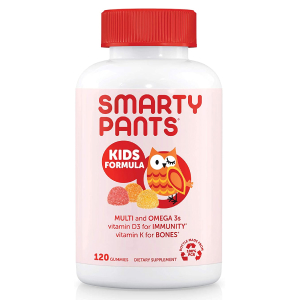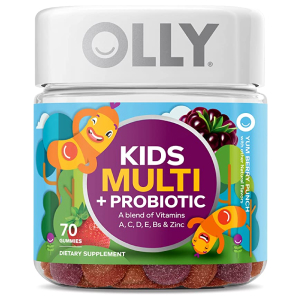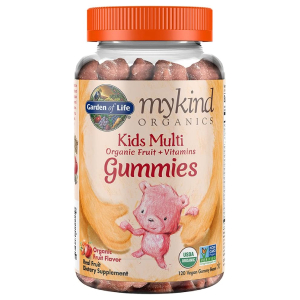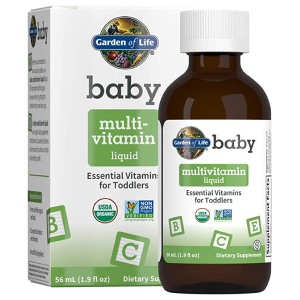 Expert's opinion
Expert's opinion
The article is a subjective view on this topic written by writers specializing in medical writing.
It may reflect on a personal journey surrounding struggles with an illness or medical condition, involve product comparisons, diet considerations, or other health-related opinions.
Although the view is entirely that of the writer, it is based on academic experiences and scientific research they have conducted; it is fact-checked by a team of degreed medical experts, and validated by sources attached to the article.
The numbers in parenthesis (1,2,3) will take you to clickable links to related scientific papers.
5 Best Vitamins For Kids 2024: Top Multivitamins Reviews
All articles are produced independently. When you click our links for purchasing products, we earn an affiliate commission. Learn more about how we earn revenue by reading our advertise disclaimer.

Ritual Essential for Kids 4+
- Vegan and sugar-free
- Omega-3 DHA helps support brand health
- Includes fiber that improves digestive health

SmartyPants Kids Formula Daily Gummy Multivitamin
- No synthetic ingredients, artificial flavors, or colors
- Soy, dairy, nut, and gluten-free
- Nine organic whole fruits in every bottle

OLLY Kids Multi+ Probiotic Gummy Multivitamin
- A boost of live probiotics
- Natural Flavors. Natural colors from purple carrot juice
- Antioxidants
Vitamins for kids are essential to develop and grow; these sources can easily be found in everyday foods. The key is for a child’s diet to be well-balanced to obtain all the essential nutrients.
Most healthy children don’t need supplements, but for those kiddos that would be happy surviving on pizza and fries, a kids multivitamin can help close the nutritional gap. Other situations calling for supplementation are when children have food allergies, are picky eaters, are on a strict vegetarian or vegan diet, or have medical conditions.
Before adding a supplement to your child’s daily routine, consult with your child’s doctor. Vitamins and minerals can be toxic to children if over-consumed; it can especially be a problem with the gummy vitamins that can be confused for candy.
As noted in a case study[1], three children were admitted to the hospital for overdosing on gummy supplements in a few days and only caught when the nanny noticed the bottle emptied too quickly.
Best Vitamins For Kids on the market in (April. 2024)
- Ritual Essential For Kids 4+ – Editor’s Choice
- SmartyPants Kids Formula Daily Gummy Multivitamin – Best Natural Ingredients
- OLLY Kids Multi+ Probiotic Gummy Multivitamin – Best Value
- Garden of Life Kids Gummies Vitamins – Best for Transparent Ingredients
- Garden of Life Baby Multivitamin Liquid – Best in Liquid Form
Do Kids Really Need Multivitamin Supplements?
It depends. Does your child have a restrictive diet? Or a medical condition that can affect the absorption of nutrients?
How do you know if your child has a restrictive diet? Or if your child’s medical condition affects the body from absorbing nutrients?
Ask yourself
- Does my child have lactose intolerance? If so, your child may benefit from a multivitamin to support vitamin D and calcium needs.
- Is my child very picky? Your picky eater may not like fruits and vegetables and can do well with a multivitamin that includes the widest variety of vitamins and minerals to fill your child’s needs.
- Is my child’s vegan or vegetarian diet varied enough? If you are unsure, you can always consult with a Registered Dietitian to help you figure out if your child’s meals are varied enough. Otherwise, your child may need some additional supplements to help them along.
- Does my child have a medical condition? Having a food allergy or a condition of the stomach or intestines should prompt you to consult your child’s doctor, who can help you figure out what your child needs for that medical condition.
In any of these cases, you must know what your child eats and does not eat to know how varied your child’s diet is.
The following are the five best multivitamins for kids in 2022.
Best Vitamins For Kids in 2024
Ritual Essential For Kids 4+
A sugar-free multivitamin that provides more than just vitamins and minerals, it comes with omega-3 fatty acids and fiber.
- Sugar-free
- Omega-3 Doxyhexanaeoic Acid (DHA)
- Includes fiber and prebiotics
- Not recommended for younger kids (intended for ages 4 years old and above)
When you want a supplement for your child, you want the best. Ritual created Essential for Kids 4+ with “picky eaters in mind.” Featuring a berry citrus flavor for children between 4 and 12 years old.
It’s sugar-free, gluten and allergen-free, and products are free from genetically modified organisms (non-GMO). Ingredients are traceable, each ingredient can be traced back to its source, so you know what your child gets.
It also uses third-party lab testing and is manufactured in accordance with the Food and Drug Administration’s ( FDA) Good Manufacturing Practices Program (GMP).
It’s sweetened with monk fruit extract, so there are no sugars or sugar alcohols. It includes vitamin C, vitamin D, vitamin E, vitamin B12, folate, and 50 mg of omega-3 Docosahexaenoic Acid (DHA) to support brain health and fiber with a prebiotic blend to contribute to digestive health.
The label on this supplement compares the daily value of the ingredients to those needed by an adult on a 2,000-calorie diet instead of a child aged 4-8, so checking the label for adequacy of nutrients is not possible for this age group.
This supplement comes as a gummy vitamin, with the recommended serving size of three gummies per day to deliver key nutrients.
Ritual is a subscription service with monthly shipments, a 30-day money-back guarantee, and easy subscription management through its account portal.
SmartyPants Kids Formula Daily Gummy Multivitamin
A multivitamin that features natural ingredients from whole fruits and is ideal for children with food allergies.
- No synthetic ingredients, artificial flavors, or colors
- Soy, dairy, nut, and gluten-free
- Nine organic whole fruits in every bottle
- Not recommended for younger kids (4 years old and above)
SmartyPants is designed to provide nutrients that support immune health, bone health, and energy metabolism. Third-party tested, and NSF certified, this multivitamin supplement features all fat-soluble vitamins; vitamin A, vitamin D, vitamin E, and vitamin K.
It also includes several other vitamins and nutrients such as the B vitamins, folate, omega-3 fatty acids- eicosapentaenoic acid (EPA), and DHA from sustainably sourced fish oil; all to help with growth and development.
Featured nutrients are vitamin D for immune support and omega-3 for brain development and cognitive development.
Its other ingredients are natural sugar sources from organic cane sugar and tapioca syrup; the colors are also naturally obtained from black carrot juice concentrate and turmeric. It’s free of eight major food allergens; these chewable vitamins are recommended for children four years of age and older.
The dosage is four gummies per day, thoroughly chewed with or without food. You can purchase these vitamins alone or subscribe and save up to 15% with a bulk purchase. You have a 30-day money-back guarantee.
OLLY Kids Multi + Probiotic Gummy Multivitamin
Olly Kids Multi+ comes with probiotics for happy intestines, natural flavors from vegetables, and antioxidants.
- A boost of live probiotics
- Natural flavors, natural colors from purple carrot juice
- Antioxidants
- Processed in a facility that may contain soy, egg, peanuts, tree nuts, milk, fish, shellfish, and wheat.
OLLY Kids is a gummy multivitamin that takes care of your child’s gut bacteria; it includes probiotics making it the best vitamin for kids’ immune systems. It also has vitamin A, vitamin C, vitamin D, vitamin E, B vitamins, folate, and zinc.
The addition of probiotics makes this multivitamin stand out; for a child that may avoid dairy products (a good source of probiotics) in their diet due to allergies or preference, this can be a way to obtain them.
OLLY Kids Multi + Probiotic is third-party tested, with no artificial flavors or colors, and gluten-free. These are vitamins for 2-year-olds and older, although the dosage changes according to the children’s ages.
The dosage recommendation is for 2-3-year-olds, one gummy per day, and for four-year-olds and up, chew two gummies per day; no food or water is needed.
This supplement can be bought on its own or subscribed to and save up to 15%, with a 30-day money-back guarantee.
Garden of Life Kids Gummies Vitamins
Mykind Organics kids multivitamin has vitamins from whole foods. No synthetic ingredients or syrups are used.
- Organic whole fruits
- No synthetic ingredients, artificial flavors or colors
- Non-GMO, Vegan, gluten-free, kosher, and nut-free
- The child must be able to chew well
Looking for the best kid organic vitamins, Garden of Life’s Mykind brand provides organic multivitamins for kids four years and over who can chew thoroughly.
It comes with all of the fat-soluble vitamins, such as vitamins A, D, E, and K, including vitamin C, folate, and B vitamins, all from whole food sources. The label is clear on each food source and which part of the plant is used; bulb, leaf, stem, stalk, flower, peel, or fruit.
These multivitamins are the first to be made from real fruits and vegetables that are organic, non-GMO and certified vegan. You won’t find fillers, synthetic ingredients, artificial flavors or colors, candy ingredients, or syrups. These chewable are lightly dusted with organic rice powder, not sugar.
The recommended dosage is four gummies daily with food and under adult supervision. You can buy these supplements individually, available in select stores. If you purchase through Garden of Life, you get a 30-day money-back guarantee.
Garden of Life Baby Multivitamin Liquid
Garden of Life’s baby multivitamin comes in liquid form for babies and toddlers, it contains all the essential vitamins for growth and development in an organic base.
- Liquid form
- 13 Essential vitamins and minerals
- Non-GMO, Vegan, gluten-free
- Organic
- Cannot be taken directly by mouth
Looking for the best liquid multivitamin, well Garden of Life has a baby multivitamin that isn’t only for babies; it can also be used as toddler vitamins.
If you can’t get your child to take vitamins, adding liquid vitamins to food or beverages can help increase the child’s nutrients. In this liquid multivitamin, you will find that the 13 essential vitamins and minerals are sourced from certified organic real food, non-GMO, free of gluten, and vegan.
You will find vitamin C, vitamin E, B vitamins, and minerals. There is also 50 mg of an organic food blend contained in the ingredients.
Babies given more than 500 ml of infant formula[2] per day do not need supplemental vitamins. Shake the bottle well before administering since some ingredients may settle to the bottom.
You can get all the necessary nutrients for children in a healthy dose. The recommended dose is to add 1 ml daily to food or liquid; it’s not recommended to give directly into the child’s mouth. It comes in a 1.9 fluid ounce bottle with 56 ml.
Once opened, it must be refrigerated and used within 90 days of opening. It comes with a 30-day money-back guarantee.
Essential Vitamins For Kids?
Of course, children need all the essential vitamins and minerals everyone else needs. There shouldn’t be a problem obtaining the key nutrients with adequate nutrition. But if your child needs some help from vitamin and mineral supplements, there are some nutrients to watch.
These nutrients, Vitamin A, Vitamin D3, Vitamin E, Vitamin K, Vitamin B12, B6, iron, iodine, choline, and zinc, are crucial for brain development at an early age. These nutrients tend to be the ones affected the most by poor eating habits or restrictive diets.
Knowing what your child may need depends on their style of eating. For example, if your child is on a vegan or vegetarian diet, they may not be getting vitamin B12, which can usually be found in animal sources.
Also, some fortified foods can add vitamins and minerals that are not naturally found in some foods, like dairy products.
If your child does not eat dairy products, they may miss out on Vitamin A, Vitamin D, calcium, and sometimes zinc, iron, and folate in fortified milk products.
Choosing a multivitamin because it’s a gummy or liquid form should not be the only criteria you use to select a supplement. You must consider several factors to choose the best multivitamins for your child.
How To Choose The Best Multivitamin For Kids
When it comes to your child and over-the-counter supplements, always consult with your doctor or Registered Dietitian for their recommendations based on your child’s current health status and age.
Usually, a doctor can make a recommendation that is age-appropriate and individualized. If your child’s doctor says any multivitamin is acceptable, read on for things to look for in a supplement.
Age
Choose a vitamin appropriate for your child’s age group; you can find a liquid vitamin for infants, vitamins for 2-year-olds or toddlers, and general children’s vitamins and mineral supplements.
Children’s ages matter for dosage; younger children will often be recommended a smaller dosage than older children.
Dosage
Follow the recommended dosage on the manufacturer’s label; it will always identify the children’s ages and amount to take.
Too much dosage of vitamin and mineral supplements can be toxic to children, especially the fat-soluble vitamins A, D, E, and K, which can accumulate in the tissues and reach toxic levels if too high.
Contact the poison control center immediately if you suspect that your child has accidentally overdosed on vitamins.
Third-Party Testing
Supplements are not required to submit their products for third-party testing[3]; some take this quality control measure and verify that the product contains the ingredients it lists and is not contaminated by toxic materials such as mold, fungi, or heavy metals.
The testing ensures the quality of the product, but not its effectiveness in the body or if it will interact negatively with any medications.
You can identify a product that has gone through third-party testing with a seal on the label. The most common and reputable companies are National Sanitation Foundation (NSF), the United States Pharmacopeia Convention (USP), and ConsumerLabs.
Companies may choose to use an independent lab for their testing. Nevertheless, don’t take the company’s word for it; look for a seal on the label.
Form
Finding the form your child likes will make a difference in whether your child takes it. The variety is greater for children depending on their age and need. You can choose between liquid, chewable and gummy forms.
Supplement Label
Reading the supplement label is also important; besides the vitamin and minerals, some include additional nutrients that you may or may not want.
You may want an iron-containing supplement to help with iron deficiency, a probiotic supplement to help with immune function and digestion, and omega-3 for brain development and cognitive development in early infancy[4] and adults[5].
Things you may not want are artificial sweeteners and high fructose corn syrup which can easily be substituted by fruit blends or natural sugar. Ingredients that are not useful but just fillers or synthetic ingredients like talc or artificial colors are not desirable in your supplement.
For children, you will want to avoid supplements that exceed 100% of the recommended daily value according to children’s ages.
Final Thought
Every parent wants their child to be healthy and get all the nutrients they need and finding the best multivitamins can be overwhelming.
The good news is that most children obtain all the essential vitamins from a balanced diet. But if you know your child may need a supplement because they are a picky eater or have medical conditions, a supplement can help.
Choosing a dietary supplement that has all the vitamins you think your child needs should be done with consideration of what is in the multivitamin.
Obtaining essential nutrients through children’s vitamins, you will need to read the supplement label with recommendations based on age. So don’t just grab a kid’s supplement but look at the label and see if it contains the nutrients you want for your child.
Remember that supplements should not be the primary source of nutrition but are considered a way to obtain what may not be consumed through foods.
Frequently Asked Questions
A well-balanced diet can provide all essential nutrients for toddlers under two years old. If you are concerned that your child may not have a healthy diet and need specific vitamins, consult with your child’s pediatrician before buying an over-the-counter supplement.
Yes, children’s needs are different, and their Recommended Dietary Allowance (RDA) is specific to a child’s age and stage of life. Labels generally use “daily value” based on a sample population’s calories level. For adults, 2,000 calories are used as the representative diet for the daily value, and for kids, it’s 1,000 calories.
Not always; if planned well, a child can obtain all they need from eggs, yogurt, and cheese if these are included in their diets. Key nutrients can be missed in a vegan diet, like vitamin A, vitamin B12, vitamin D, iron, calcium, zinc, and riboflavin.
If you offer your child a variety of foods every day and your child tries a little of everything, this is a good sign your child is getting everything they need.
Supplements can come with some side effects; the most notable are upset stomach, nausea, constipation, or diarrhea[6].
Children on a strict vegan diet can be deficient in vitamin B12 as its natural source is only through animal-based products. A child can benefit from a vitamin B12 supplement; first, consult your child’s Pediatrician or Registered Dietitianwhen placing children on restrictive diets.
That is true; vitamin D can be obtained from the sun. But small children are often covered and protected from sunburn and may not get enough exposure. Also, children that live in areas sun is not as available or with dark skin tones may not obtain enough sunlight to make vitamin D.
Most doctors and nutritionists will often recommend iron-rich foods before recommending the iron mineral supplement. The reason is that iron supplements can cause constipation in some children, and foods rich in iron will often be enough.
+ 6 sources
Health Canal avoids using tertiary references. We have strict sourcing guidelines and rely on peer-reviewed studies, academic researches from medical associations and institutions. To ensure the accuracy of articles in Health Canal, you can read more about the editorial process here
- Lam, H.S., Chow, C.M., Poon, W.T., Lai, C.K., Chan, K.C.A., Yeung, W.L., Hui, J., Chan, A.Y.W. and Ng, P.C. (2006). Risk of Vitamin A Toxicity From Candy-Like Chewable Vitamin Supplements for Children. Pediatrics, [online] 118(2), pp.820–824. Available at: https://www.publications.aap.org/pediatrics/article-abstract/118/2/820/69014/Risk-of-Vitamin-A-Toxicity-From-Candy-Like?redirectedFrom=fulltext
- NHS Choices (2022). Vitamins for children. [online] Available at: https://www.nhs.uk/conditions/baby/weaning-and-feeding/vitamins-for-children/
- Office (2021). FDA 101: Dietary Supplements. [online] U.S. Food and Drug Administration. Available at: https://www.fda.gov/consumers/consumer-updates/fda-101-dietary-supplements
- Singh M (2021). Essential fatty acids, DHA and human brain. Indian journal of pediatrics, [online] 72(3). Available at: https://pubmed.ncbi.nlm.nih.gov/15812120/
- HORROCKS, L.A. and YEO, Y.K. (1999). HEALTH BENEFITS OF DOCOSAHEXAENOIC ACID (DHA). Pharmacological Research, [online] 40(3), pp.211–225. Available at: https://pubmed.ncbi.nlm.nih.gov/10479465/
- Biesalski, H.K. and Tinz, J. (2017). Multivitamin/mineral supplements: Rationale and safety. Nutrition, [online] 36, pp.60–66. Available at: https://pubmed.ncbi.nlm.nih.gov/28336109/





